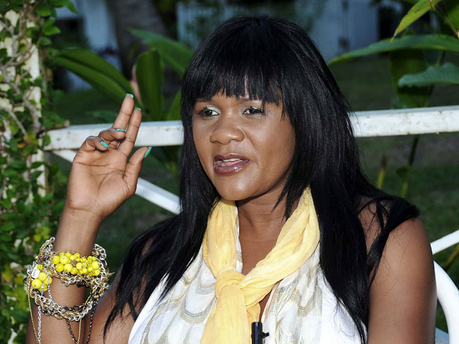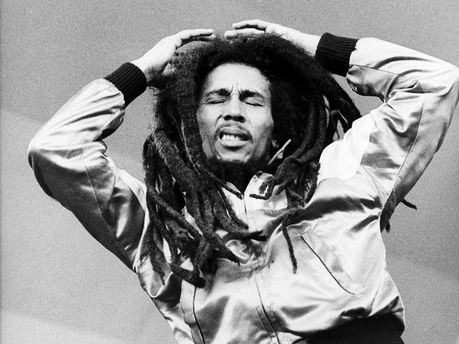Columns By Category
Popular Articles
- THE REALITY OF TACKY AND SAM SHARPE
- PLEASE DON’T BETRAY US AGAIN POLITICIANS
- CRY, MY MURDEROUS COUNTRY
- MODERNIZING THE PNP: VERSION.2020
- IS THE EXCHANGE RATE ON TARGET OR IS IT A WHOPPER?
- CARICOM: BEACON OF DEMOCRACY OR COWARDLY DISGRACE?
- DEMOCRACY PREVAILS IN THE UNITED STATES
- THE CRIME STATISTICS SPEAK FOR THEMSELVES
- PETROJAM, OIL PRICES, AND THE $7 TAX
- Kevin O'Brien Chang | Brains, not brutality – smart(phone) crime fighting
- TERRORISM IN JAMAICA
- STOP CURRENCY CRISIS TALK
- 'CASTIGATED KD' AND THE 9 YEAR WONDER
- GET PAST MERE TALK ON DONS AND GARRISONS
- LOW VOTER TURNOUT MYTHS AND ELECTION PREDICTIONS
- HOW GREAT CAN BROGAD BE?
- PNP WAS SOCIALIST FROM THE START
- AN AGE AND GENDER RE-ALIGNMENT ELECTION?
- Most influential Jamaican of 2010-2019?
- NO GAYLE, NO RUSSELL, NO TALLAWAHS
Bob Marley Reggae Superhero; Lady Saw Dancehall Queen
- 3-6-2011
- Categorized in: 2011 Articles, Culture
http://jamaica-gleaner.com/gleaner/20110306/focus/focus8.html
Published: Sunday | March 6, 2011
Kevin O'Brien, Gleaner Writer
Bob Nesta Marley is by far the most famous figure Jamaican music has ever produced. Mention Jamaica, and foreigners who scarcely know in which hemisphere the country is located will cry in recognition, 'Bob Marley!' Millions of people the world over know of reggae only because of him, and have never heard of another Jamaican musician. It's a truly unique fame, covering all corners of the Earth, surpassing in universality the adulation accorded to other rock martyrs like Elvis Presley and John Lennon.
Marley is increasingly becoming to Jamaica what Robert Burns is to Scotland - most famous son, national bard, and symbol of cultural identity. The parallels between the two great Roberts are uncanny. Both were born to humble circumstances in a small country with a few million inhabitants. Both were free spirits who praised the intoxicating pleasures of ganja and whisky, respectively. Both fathered numerous children from multiple mothers - roughly nine from seven for Marley and 11 from six for Burns. Both penned world anthems, with One Love being arguably the closest modern equivalent to Auld Land Syne. And both died young, Marley at 36 and Burns at 37.
Burns' January 25 birthday is Scotland's national day, an occasion for 'bold john barleycorn'-inspired admirers everywhere to praise Rabbie, and test the truth of 'Kings may be blest but Tam was glorious, o'er all the ills o life victorious'.
Marley's February 6 'earthday' already stirs up 'kaya'-fuelled 'wake up and turn I loose' global tributes to Nesta, and might one day become as important to Jamaicans everywhere as 'Burns night' is to the Scots around the world. Time alone, time will tell.
Ideal global icon
But it's not just music that has made Marley a great international icon. His songs are inseparable from the handsome, dreadlocked, mixed-race, almost Christlike visage that made him visually an ideal global icon. Being obviously not pure anything meant every race could identify with him, in a way often not possible with someone like say Peter Tosh. And in our still Western media-dominated world, those accepted by European and American audiences become famous everywhere.
Musician Leroy Sibbles once had this to say:
"As great as Bob Marley was, I think Peter Tosh was just as good. But he couldn't make it as big as Bob, because Bob had a lighter complexion and the record companies were able to promote him more, and he was accepted easier. Look at Toots. There's no one better than Toots - black, white, blue or pink. But he never reached the level of Bob Marley because of the same reason."
If Bob Marley looked like Peter Tosh and vice versa, whose music would be more popular today? It's an interesting question to ponder.
Then, there is the martyr factor. In our image-driven age, as the stand-up comics joke, dying young is a great career move. Most of the dominant 20th-century icons - James Dean, Marilyn Monroe, Elvis Presley, Che Guevara, Princess Diana for instance - died before 40, or in John F. Kennedy's case looked it. While their surviving contemporaries slowly dwindled into aged mortality, they, in the public mind, stayed forever young and glamorous. Watching Bunny Wailer at the New Kingston concert a few years back, some observers wonder how people would have reacted to a similarly grey and grizzled 60-year-old Bob Marley. Glory is a cold sun that warms no bones. But in the minds of the living, the early dead remain forever young and immune to the ravages of age - untarnished blank canvases on which we can paint our dreams of the ideal. Marlon Brando was a better actor than James Dean; Eisenhower was a greater leader than Kennedy; and Johnny Cash was a superior artiste to Elvis Presley. But in the popular mind, the accomplishments of fat old Marlon, bald Dwight, and wrinkled Johnny just can't compete with handsome, sleek, airbrushed Jimmy, J.F.K. and Elvis.
None of this brings Marley's greatness into question, although some fervent admirers do get carried away. The man was a singer and songwriter after all - who like all musicians produced the occasional lousy tune - not some latter-day biblical prophet. He certainly never professed such a role for himself.
But he was without a doubt one of the finest musicians of the 20th century, and his global popularity is perhaps unparalleled. Americans, Asians, Europeans, Africans, the young, the old, the middle aged - everyone seems to like Bob Marley's music. And his lustre simply keeps growing; in 2000, Time Magazine chose Exodus as Album of the Century, and the BBC named One Love Song of the Century. It's hard to top that for lasting global appeal.

Lady Saw - kicking down the glass door
Marion 'Lady Saw' Hall is the most celebrated exponent of 'slackness' in Jamaican music history. As the first local woman performer to become a top-billing main act and to write her own material, she is probably also reggae's most influential female artiste, kicking down the glass door for the likes of Macka Diamond, Tanya Stephens, Ce'Cile and Queen Ifrica. Almost uniquely, Lady Saw is both a top-notch 'riddim rider' deejay, and a highly accomplished singer. The acknowledged 'queen of dancehall' has in recent years moved away from 'slackness', and has even begun to appear at cultural shows like Rebel Salute under her real name Marion Hall.
Here, she shares some insights on Jamaica and its music.
"What makes Jamaican music so popular around the world? I think it's because we produce music for all moods and emotions. Maybe it's because we Jamaicans are so in touch with our feelings and so direct about expressing them. But our music just seems to connect with people from all different backgrounds. I remember, after a show in Switzerland, how a lady came up to me crying and saying how my song, 'I am not the world's most prettiest and I turned out fine', had touched her to the core, and how it summed up how she had always felt but never been able to express. Plus, there's the beat of our music. It's the sweetest in the world. Even when people can't understand the lyrics, they are just captivated by our 'riddims'.
"Music reflects society but it also influences it. I've had women come up to me and tell me how my songs like Hard Core had taught them how to make their men happy in bed, and even had some tell me they lost their virginity to one of my songs. Now if it's adults saying that, I have no problem, and even feel good. But not if it is a young teenager. There's no doubt lyrics can influence schoolchildren. Just look at the Gully and Gaza fights among our schoolboys. Yes, young minds can be misled and (they) should not be listening to some kinds of music that are okay for adults, but not for them.
"When I started out in the music business, I did only clean songs - my first album was country and gospel. But I wasn't getting anywhere, and saw these male artistes having big dancehall hits with real slack songs. So I decided, if you can't beat them, join them. I don't know why I get so much criticism for doing as a woman what so many men were doing before me. But to be honest, if they started to censor songs now because of the effect on schoolchildren, it wouldn't bother me. I know I can change to suit whatever is required by my audience. But when the audience demands hardcore and we give it to them, well, you can't knock a man for eating food.
"I don't know why Jamaicans like slackness so much and why we produce so many more hardcore songs than anywhere else. Maybe it's just our direct nature. We are not the type to go round and round and pretend. If is so it go, we going to say is so it go."


